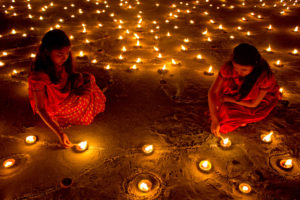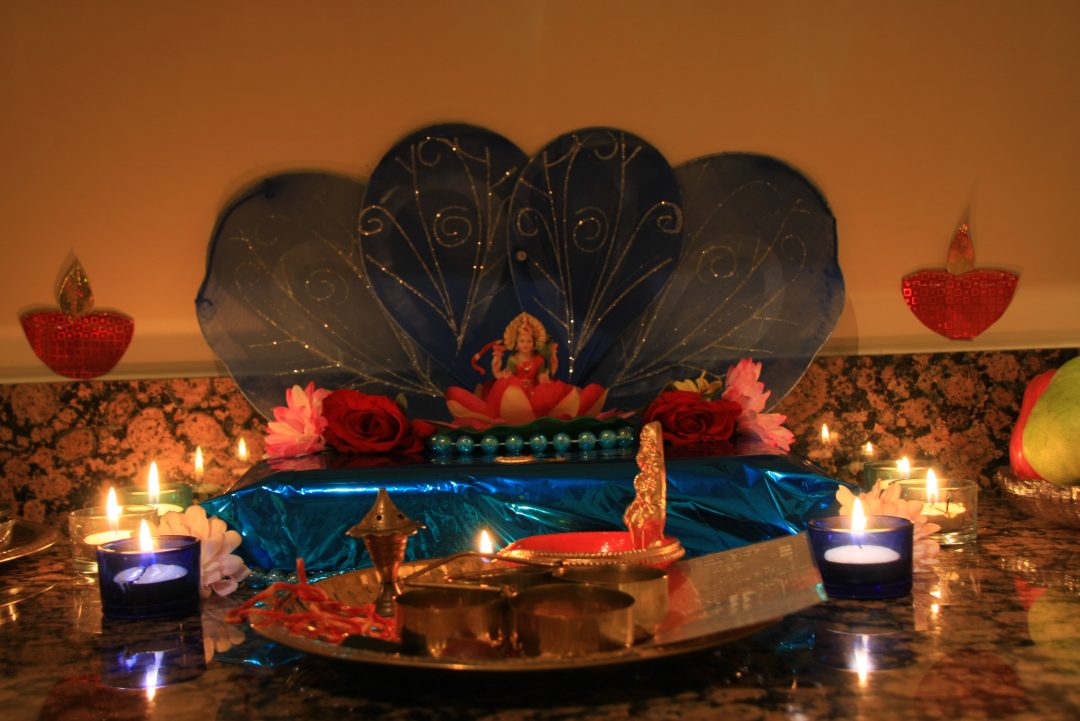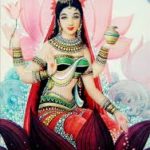The Importance of Goddess Laxmi
The word Laxmi is derived from the Sanskrit word Laksha, meaning to perceive or observe, and is synonymous with Lakhya, meaning aim or objective. Lakshmi is therefore believed to be the goddess of all objectives, material as well as spiritual. Hindus consider Laxmi as the embodiment of beauty, grace, charm, generosity and courage, and worship her for wealth, prosperity, wisdom, fertility, and resolution of financial problems.
Laxmi is by far the most popular and commonly worshiped goddess, and perhaps the second most popular deity among Hindus, next only to Ganesha. Therefore, she is often worshiped along with Ganesha.
According to the legend, at one time, Devas (gods) and Asuras or Danavas (demons) were both mortal. In order to obtain immortality, they decided to churn the Kshira Sagara (ocean of milk) to bring up Amrit or Nectar of eternal life. To accomplish that, they placed a mountain on the back of Vishnu incarnated as Kurma, the tortoise, and used Vasuki, the great venom spewing serpent, to wrap around it to churn the ocean. As the churning went on, many divine celestial objects came up. Among them emerged goddess Lakshmi, the daughter of the King of Kshira Sagara. The last to come up was Amrit, the nectar of immortality. Having completed his purpose, Vishnu ended the Kurma avatar and emerged from the ocean as Mohini, a beautiful maiden. While the Danavas were distracted by her beauty, she gave the Amrit to Devas, thus giving them immortality. By the time the Danavas realized this, the Amrit was finished, depriving them of immortality forever. Vishnu was taken up by the beauty of Laxmi, and later married her to make her his wife. She stayed with Vishnu in his future incarnations: as Sita with Rama, and as Radha and then Rukmini with Krishna. Since then, Diwali and Laxmi Pujan are celebrated in remembrance of the day Laxmi emerged from the Kshira Saagara.
According to another legend, Vishnu, in his Vamana avatar (incarnation) as a dwarf, banished the demon, King Bali, to hell and then returned on this day to Vaikuntha to be with his wife Laxmi. Since then, people worship goddess Laxmi on this day hoping to find her in a joyous mood, thank her for her blessings during the just-completed harvesting season, and pray for her continued blessings for abundant material wealth and prosperity in the coming year.
The Importance of Laxmi Puja in Diwali Celebrations
Diwali is the most important and commonly celebrated festival of Hindus in India and around the world. Diwali, derived from the Sanskrit word Dipawali, literally means a row of lamps. It is a celebration of the blessings of all good things we are fortunate to have and the expression of hope that with effort and determination all the difficulties and obstacles of life will be overcome.
 In its most elaborate and inclusive version, Diwali extends over a period of six specific consecutive days of Hindu lunar calendars. However, the fourth day of Diwali, which falls on the last no moon day of the Ashwin month in the Indian National (Hindu Lunisolar) calendar, is by far the most important and universally celebrated day of the festival across all regions and is referred to as Laxmi Pujan day.
In its most elaborate and inclusive version, Diwali extends over a period of six specific consecutive days of Hindu lunar calendars. However, the fourth day of Diwali, which falls on the last no moon day of the Ashwin month in the Indian National (Hindu Lunisolar) calendar, is by far the most important and universally celebrated day of the festival across all regions and is referred to as Laxmi Pujan day.
Considering the importance of material wellbeing in peoples’ lives, it is not surprising that the worship of Laxmi, the goddess of wealth and prosperity, holds a unique place in Diwali celebrations. Laxmi Pujan, therefore, is by far the most important and most commonly celebrated day of Diwali across all regions. Interestingly, this is the only day celebrated not only in homes and temples but also in businesses to seek her blessings for the financial wellbeing of the business ventures in the years to come.
Laxmi is worshiped on this day in one of three different forms: Mahalaxmi, the goddess of wealth and prosperity, Mahasaraswati, the goddess of knowledge, and Mahakali, the destroyer of evil demon Raktabhija.
It is believed that Laxmi arrives only in the evening and enters only those homes that are immaculately clean, well-lit, and have their doors open as a sign of true welcome to her. Therefore, on this day, ladies light oil lamps in their homes, draw welcoming Rangolies (colored sand art) in front of the doors, and keep the front doors open. Many women use Rangoli to draw footsteps from the door to the altar showing the path for goddess Laxmi to follow.
Padwa as Celebration of Gruha Laxmi
The fifth day of Diwali, which falls on the first new moon day of the Kartik month in the Hindu Lunisolar calendar, is Padwa. The day is celebrated not only as the beginning of a new era and a new year, but also a day of appreciation and veneration of the Lady of the house. In Hindu philosophy, the Lady of the house is called Gruha (home) Laxmi, and is considered the embodiment of goddess Laxmi who came to the home as a new bride. To honor the important role played by this precious person in creating and holding the family together, Padwa day is celebrated by husbands buying gifts for their wives.






